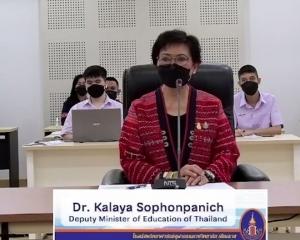Macandrew Intermediate principal Whetu Cormick said the Ministry of Education's national standards are being introduced at an "outrageous" pace, and the Government would be wise to slow down and implement them over a five-year period like previous education initiatives.
"For anything to work, we need time to unpack, analyse, understand and implement the standards. That could take up to five years.
"Under the previous government, the draft curriculum was sent out in 2006 and full implementation is only just rolling out this year."
Mr Cormick said national standards was an initiative of similar size and significance as the new curriculum, and if Education Minister Anne Tolley was "serious about addressing underachievement in schools, there needs to be time for the people implementing it".
The Macandrew Intermediate Board of Trustees took a stand against national standards late last year by refusing to open a Ministry of Education box containing information about the initiative.
However, Mr Cormick has now established his own plan for introducing the standards.
He will "unpack" the box gradually over the next 12 months to ensure the standards are understood and embedded properly at the school.
Many other issues still needed addressing, such as what would happen to the results from the standards testing, he said.
Many of the schools in Otago which managed to implement the standards may threaten to withhold results from the ministry.
"I would never act against the law, but unless the ministry can assure us that the information they glean from us won't be put into league tables, we would have to have a discussion with the board about what information we would release to the ministry."
Green Island School principal Steve Hayward agreed, and believed the number of schools which would take the action would be significant.
"I would say there will be a number that will boycott the standards, full stop. But on the other hand, there will be a number who are ready to go tomorrow.
"Then further down the line, each school and board of trustees will have to sit down and decide how much of this information they will pass on to the ministry.
"It's not about hiding stuff from the parents. It's about making sure this information doesn't end up in the wrong hands and used for other purposes."
Otago Primary Principals Association president Jenny Clarke said it was unlikely the OPPA executive would collectively boycott the introduction of national standards, although some individual schools might choose to take a different stance.
"It is folly to ignore the evidence from overseas that the implementation of national standards (and testing in some countries) is the panacea for under-achievement when they have learned through great expense and lost good faith from the teaching profession, that indeed it is not," she said.
In the past, Mrs Tolley has said there would be constant evaluation of the standards as they were implemented, and if adjustments needed to be made to the initiative, that would happen.
Mrs Tolley has also announced $26 million has been made available to provide training and support to teachers, principals and boards of trustees to help with the implementation of standards in reading, writing and maths.
"This is in addition to the $36 million over four years which will be used to support schools which have identified students who need help."
Mrs Tolley said she was looking forward to speaking to parents and communities about how national standards would benefit children.











